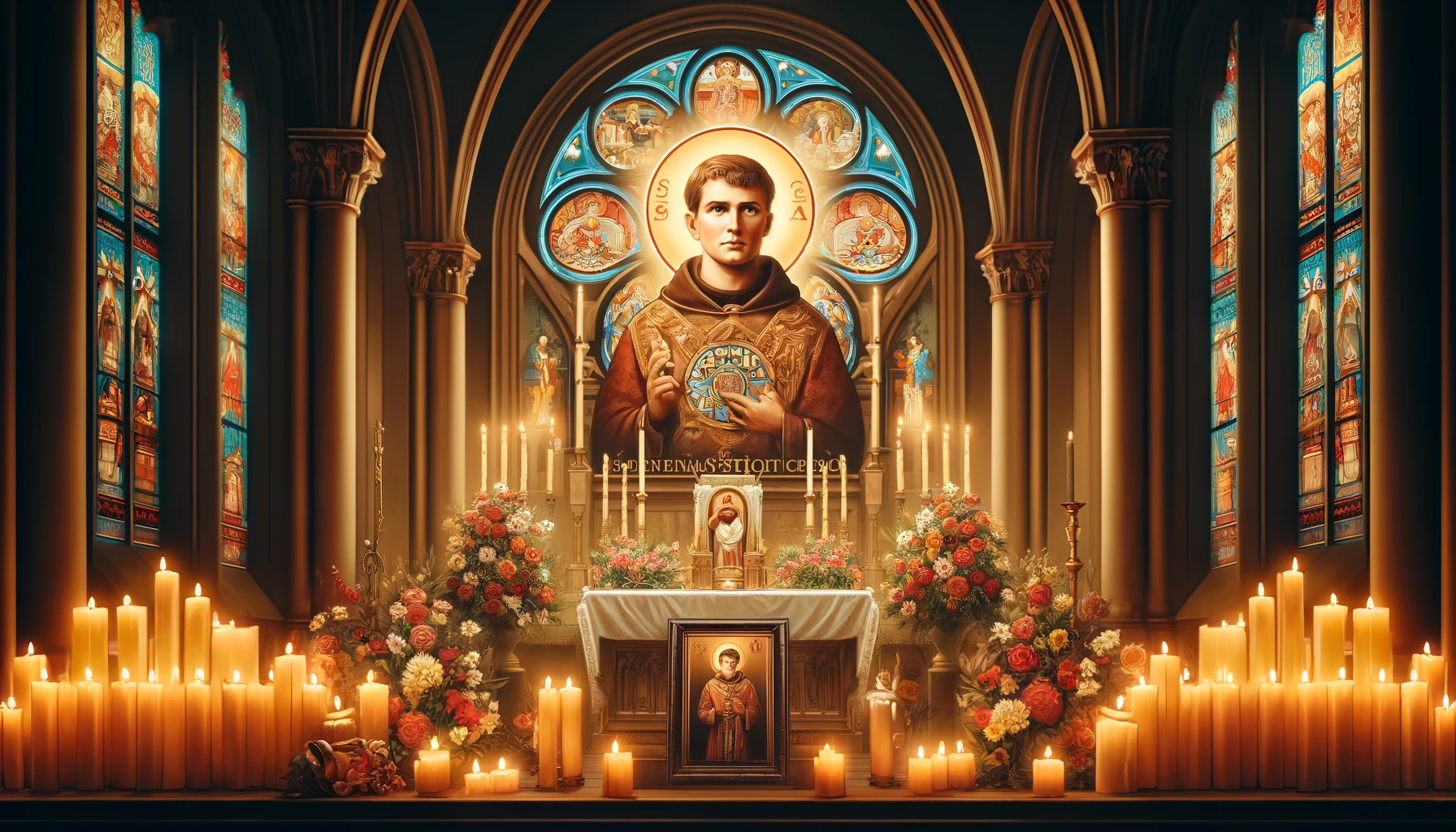
- This event has passed.
Feast day of St Bernard
August 20

St. Bernard’s Feast Day, celebrated annually on August 20th, honors St. Bernard of Clairvaux, a medieval French abbot and a major figure in the Cistercian monastic movement. Known for his piety, eloquence, and role in the spread of monasticism in Europe, St. Bernard’s life and works have left a lasting impact on Christian theology and ecclesiastical structure. This feast day not only commemorates his spiritual contributions but also celebrates his canonization and the enduring legacy of his teachings.
The significance of St. Bernard’s Feast Day transcends historical commemorations, serving as a spiritual reflection and a call to live out the values he championed. Devotees and religious communities worldwide observe this day with various religious activities, highlighting its importance in the liturgical calendar. Through prayers, sermons, and communal gatherings, the day fosters a deeper understanding of faith, community, and personal devotion.
History and Meaning of St. Bernard’s Day
Born in 1090 in Fontaine-lès-Dijon, France, St. Bernard quickly rose to prominence within the Christian community for his deep faith and commitment to the monastic life. At the age of 22, he entered the Cistercian Order and later became the abbot of Clairvaux Abbey, significantly influencing the order’s expansion across Europe. His writings, including sermons and treaties, were foundational in shaping Christian thought and monastic practices.
The feast day of St. Bernard not only marks his death on August 20, 1153, but also celebrates his contributions to theology and the Church. His advocacy for reform in the Church and his role in various theological debates earned him the title of Doctor of the Church. St. Bernard’s emphasis on devotion to the Virgin Mary and his writings on humility and obedience continue to influence Christian thought today.
Traditions and Rituals
Traditionally, St. Bernard’s Feast Day is marked by special liturgies and masses in Cistercian communities and other churches. These services often include readings from his works, particularly his homilies on the Song of Songs, which delve into the mystic relationship between the soul and God. In many communities, the day is also marked by processions and special prayers, reflecting St. Bernard’s devotion to Mary, as he was known for his strong Marian devotion.
Monastic communities particularly may hold retreats or symposiums to discuss the teachings and legacy of St. Bernard. These events serve as both a spiritual renewal and an educational opportunity for adherents to delve deeper into monastic values. The rituals performed are steeped in the traditions that St. Bernard himself would have practiced and taught, serving as a bridge between past and present worship practices.
Modern Celebration of St. Bernard’s Day
In the modern context, St. Bernard’s Feast Day extends beyond church services. Many educational institutions named after St. Bernard may hold special events such as conferences, exhibitions, or public lectures that highlight his theological contributions and their relevance today. These activities aim to make his medieval thoughts accessible to contemporary audiences, emphasizing themes such as community living, spiritual introspection, and ethical leadership.
Social media and digital platforms also play a crucial role in spreading awareness about St. Bernard’s teachings. Religious communities and churches may share quotes, writings, or multimedia presentations about his life and work, engaging a broader audience and fostering a global conversation about his enduring impact on Christian spirituality.
Congratulations and Wishes
- “May St. Bernard’s wisdom inspire you to seek deeper faith and understanding. Happy Feast Day!”
- “On St. Bernard’s Feast Day, I wish you the strength to follow his example of devotion and humility.”
- “May the teachings of St. Bernard illuminate your path and lead you to peace and charity.”
- “Celebrate St. Bernard’s Day by embracing the values of community and spiritual fervor he championed.”
- “Let us honor St. Bernard by living out his legacy of faith and compassion in our everyday lives.”
- “May the courage and sincerity of St. Bernard guide you through life’s challenges. Happy Feast Day!”
- “Wishing you a blessed Feast Day filled with the spirit of St. Bernard’s enduring wisdom and love.”
- “Let’s remember and cherish the profound teachings of St. Bernard on his Feast Day.”
- “On this special day, may you find the joy and serenity that St. Bernard preached throughout his life.”
- “Happy Feast of St. Bernard! May his commitment to the Church inspire your spiritual journey.”
10 Unusual Facts
- St. Bernard was once visited by Pope Eugene III, who was his former pupil.
- He wrote over 300 letters, which have been preserved and provide insight into his thoughts on ecclesiastical politics and monastic life.
- St. Bernard was instrumental in the founding of hundreds of Cistercian monasteries across Europe.
- Despite his robust public life, he maintained a profoundly mystical private life, often documented in his theological writings.
- St. Bernard was a key mediator in disputes between powerful nobles during his time.
- He is often depicted with a white dog, which according to legend, was gifted to him by the Knights Templar.
- St. Bernard was a vocal critic of the lax practices at Cluny, a rival monastic community, advocating for a return to simpler, more pious practices.
- His sermons were so compelling that it is said they could revive the spirit of the most hardened sinners.
- St. Bernard helped end the schism of 1130, where he supported Pope Innocent II against the antipope Anacletus II.
- He was declared a “Doctor of the Church” by Pope Pius VIII in 1830 due to his significant contributions to Christian theology.
Frequently Asked Questions About St. Bernard
- Who was St. Bernard?
- St. Bernard of Clairvaux was a French abbot and a major figure in the Cistercian reform of Benedictine monasticism. He is celebrated for his writings and his deep influence on the Christian theology of his time.
- Why is St. Bernard important to the Church?
- St. Bernard is regarded as a Doctor of the Church, recognized for his theological works that shaped Christian thought, particularly regarding the Virgin Mary and monastic spirituality.
- What are some key teachings of St. Bernard?
- Key teachings include his emphasis on humility, his theological explorations of the relationship between the soul and the divine, and his deep Marian devotion.
- How do Cistercians celebrate St. Bernard’s Feast Day?
- Cistercians celebrate with special liturgies, prayers, and often, symposiums on his life and teachings, reflecting on his contributions to monastic life.
- Can anyone celebrate St. Bernard’s Feast Day?
- Yes, while it is especially significant for Cistercians, anyone can observe this day through prayer, reading St. Bernard’s works, or participating in Feast Day services.
- What writings of St. Bernard are most influential?
- His series of sermons on the Song of Songs and his treatises on Marian theology are among his most influential works.
- Did St. Bernard perform any miracles?
- While many medieval saints are noted for miracles, St. Bernard is most revered for his profound impact on theology and monasticism, not for miracles.
- What is St. Bernard’s legacy in modern times?
- His legacy persists in the continued relevance of his writings in theological studies and in the monastic practices he helped shape, which are still observed in many communities today.
- How did St. Bernard influence monastic life?
- He advocated for a return to strict adherence to the Rule of St. Benedict, emphasizing austerity, humility, and communal life, which influenced monastic practices across Europe.
- Is there a patronage associated with St. Bernard?
- St. Bernard is considered a patron saint of beekeepers and candlemakers, symbolizing his impact on industries that require diligence and devotion.
St. Bernard’s Feast Day is not merely a historical observance but a living tradition that continues to inspire and challenge both individuals and religious communities to deeper faith and more rigorous devotion. As we reflect on his life and works, the day offers a unique opportunity to engage with our spiritual heritage and reconsider our own practices of faith and community. His teachings, particularly on personal humility and communal living, remain profoundly relevant in today’s often individualistic societies.
Why This Day Is Important
The celebration of St. Bernard’s Feast Day underscores the timeless relevance of spiritual and ethical values in contemporary society. In remembering St. Bernard, we are reminded of the power of faith and the importance of community in fostering a more compassionate and understanding world. This feast day not only honors a saint but also celebrates the enduring human capacity for devotion and moral integrity.
Author’s Opinion
St. Bernard’s life and teachings offer invaluable insights into the pursuit of spiritual depth and communal harmony. His ability to articulate profound theological concepts in accessible language makes his works a valuable resource for anyone seeking to deepen their spiritual understanding. Celebrating his feast day provides a moment to reconnect with these timeless values, which can guide us toward a more fulfilling and purposeful life.




